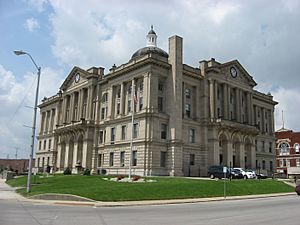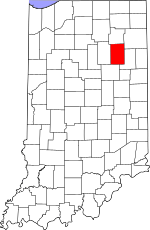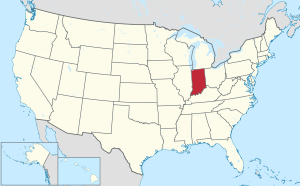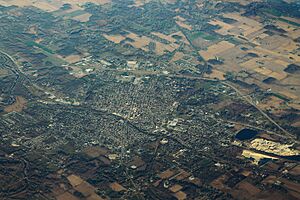Huntington County, Indiana facts for kids
Quick facts for kids
Huntington County
|
|
|---|---|

Huntington County Courthouse in Huntington
|
|

Location within the U.S. state of Indiana
|
|
 Indiana's location within the U.S. |
|
| Country | |
| State | |
| Founded | February 2, 1832 (authorized) May 5, 1834 (organized) |
| Named for | Samuel Huntington |
| Seat | Huntington |
| Largest city | Huntington |
| Area | |
| • Total | 387.72 sq mi (1,004.2 km2) |
| • Land | 382.65 sq mi (991.1 km2) |
| • Water | 5.07 sq mi (13.1 km2) 1.31%% |
| Population
(2020)
|
|
| • Total | 36,662 |
| • Estimate
(2023)
|
36,781 |
| • Density | 94.5579/sq mi (36.5090/km2) |
| Time zone | UTC−5 (Eastern) |
| • Summer (DST) | UTC−4 (EDT) |
| Congressional district | 3rd |
| Indiana county number 35 | |
Huntington County is a place in the state of Indiana, in the United States. It is called a county. In 2020, about 36,662 people lived there. The main city and county seat is Huntington. Huntington County is part of a larger area that includes Fort Wayne.
Contents
History of Huntington County

Huntington County was officially created on February 2, 1832. Its government started on May 5, 1834. Before this, it was part of the Indiana Territory. The land was gained from Native American tribes in 1818.
The first non-Native American settlers arrived in the early 1830s. They were 29 farm families from Connecticut. These families were called "Yankee" settlers. This means they were descendants of English Puritans. The Puritans had settled in New England a long time ago.
These settlers came to Huntington County because of the Wabash and Erie Canal. This canal was a waterway that connected the Great Lakes to the Ohio River. When they arrived, they found thick forests and wild prairies. The families worked together to build roads, a post office, a town hall, a church, and a school. They used trees from the area to build these structures.
The county was named after Samuel Huntington. He was an important person in American history. He signed the Declaration of Independence. He also signed the Articles of Confederation. He was even the president of the Continental Congress.
Geography and Nature
Huntington County has gentle, rolling hills. Most of the land is used for farming or cities. The Wabash River flows through the northern part of the county. The Salamonie River flows through the southern part. The highest point in the county is about 925 feet (282 meters) above sea level.
In 2010, the county covered about 387.72 square miles. Most of this (98.69%) was land. Only a small part (1.31%) was water.
Nearby Counties
- Whitley County – to the north
- Allen County – to the northeast
- Wells County – to the east
- Grant County – to the south
- Wabash County – to the west
Main Roads
Cities and Towns
- Andrews
- Huntington (the main city)
- Markle (partly in this county)
- Mount Etna
- Roanoke
- Warren
Townships
- Clear Creek
- Dallas
- Huntington
- Jackson
- Jefferson
- Lancaster
- Polk
- Rock Creek
- Salamonie
- Union
- Warren
- Wayne
Small Communities
Nature Areas
- JE Roush Fish and Wildlife Area
- Lost Bridge State Recreation Area
Famous People from Huntington County
Public Figures
- Samuel E. Cook (1860–1946), a U.S. congressman.
- J. Danforth Quayle, a U.S. representative, senator, and Vice-President of the United States.
- J. Edward Roush (1920–2004), a U.S. representative. He helped create the "911" emergency system.
- Elizebeth (Smith) Friedman (1892–1980), a writer and a pioneer in solving secret codes during World War I and World War II. She was called "America's first female cryptanalyst."
Entertainers and Leaders
- Chris Schenkel (1923–2005), a famous sportscaster.
- Archbishop John F. Noll (1875–1956), he started a Catholic newspaper called Our Sunday Visitor.
Artists
- Mick Mars, the guitarist for the band Mötley Crüe.
Athletes
- Gary Dilley, an Olympic swimmer who competed in Tokyo.
- George Haines, an Olympic coach for women's swimming.
- Chris Kramer, a professional basketball player. He played college basketball at Purdue University. He was named the Big Ten Defensive Player of the Year twice.
Places to Visit
- Huntington County Historical Museum
- Huntington University Arboretum and Botanical Garden
- Huntington University
- Edward Roush Lake
- Merillat Centre for the Arts
- Our Sunday Visitor Corporate Headquarters
- The Forks Of The Wabash
- The Indiana Room Genealogy Center
- Tel-Hy Nature Preserve
- United States Vice Presidential Museum
- Victory Noll Center
Education in Huntington County
School District
- Huntington County Community School Corporation
Private Schools
- Huntington Area Home Educators
- Huntington Catholic School
Colleges and Universities
- Huntington University
News and Media
Newspapers
- The Herald-Press (a daily newspaper)
- The Huntington County TAB
- Warren Weekly
- HuntingtonFreePress
- Huntingtonian
Radio Stations
- WBZQ 1300 AM
- Huntington North High School WVSH Viking Radio
- WQHU-LP Huntington University Radio WQHU 105.5-FM Forester Radio
Climate and Weather
| Weather chart for Huntington, Indiana | |||||||||||||||||||||||||||||||||||||||||||||||
|---|---|---|---|---|---|---|---|---|---|---|---|---|---|---|---|---|---|---|---|---|---|---|---|---|---|---|---|---|---|---|---|---|---|---|---|---|---|---|---|---|---|---|---|---|---|---|---|
| J | F | M | A | M | J | J | A | S | O | N | D | ||||||||||||||||||||||||||||||||||||
|
2
32
16
|
1.8
37
18
|
2.9
48
28
|
3.4
61
38
|
4.1
73
48
|
4.4
83
58
|
3.6
87
62
|
3.6
84
60
|
2.8
78
52
|
2.8
65
41
|
2.9
50
32
|
2.8
38
22
|
||||||||||||||||||||||||||||||||||||
| temperatures in °F precipitation totals in inches source: The Weather Channel |
|||||||||||||||||||||||||||||||||||||||||||||||
|
Metric conversion
|
|||||||||||||||||||||||||||||||||||||||||||||||
The weather in Huntington changes throughout the year. In January, the average low temperature is about 16°F (about -9°C). In July, the average high temperature is about 87°F (about 31°C). The coldest temperature ever recorded was -28°F (-33°C) in January 1982. The hottest was 105°F (41°C) in June 1988. The amount of rain also changes. February usually has the least rain, and June has the most.
How Huntington County is Governed
The government of Huntington County follows rules from the Constitution of Indiana. It also follows laws from the Indiana Code.
County Council
The County Council handles the county's money. They decide how much money the county can spend and how to collect it. Members are elected for four-year terms. They set salaries and the yearly budget. They can also approve special spending. The council has some power to set local taxes, like income and property taxes. These taxes need state approval.
Board of Commissioners
The Board of Commissioners is the main group that runs the county. They are elected from across the county for four-year terms. One commissioner acts as the president. Their job is to collect money and manage the county government.
County Court System
The county has a small claims court. This court handles smaller legal problems between people. The judge for this court is elected for four years. This judge must be a lawyer in Indiana. A constable, also elected for four years, helps the judge. Sometimes, decisions from this court can be reviewed by a higher state court.
Other County Officials
There are other important elected jobs in the county. These include the sheriff (who enforces laws), the coroner (who investigates deaths), the auditor (who checks financial records), the treasurer (who manages money), the recorder (who keeps official records), the surveyor (who measures land), and the circuit court clerk (who manages court paperwork). These officials are elected for four-year terms. People elected to these jobs must say which political party they belong to. They must also live in the county.
Population Information
In 2020, Huntington County had 36,662 people. The county had about 97 people living per square mile. Most people (97.1%) were white. About 1.7% of the people were of Hispanic or Latino background. Many people in the county have German (37.9%), Irish (14.9%), American (12.9%), or English (12.1%) family backgrounds.
In 2010, there were 14,218 households. About 32.3% of these households had children under 18 living with them. The average household had 2.52 people. The average family had 2.97 people. The average age of people in the county was 39 years old.
The average income for a household in the county was $47,697. For families, the average income was $55,630. About 11.4% of all people in the county lived below the poverty line. This included 15.6% of those under 18 and 9.8% of those aged 65 or older.
See also
 In Spanish: Condado de Huntington para niños
In Spanish: Condado de Huntington para niños

